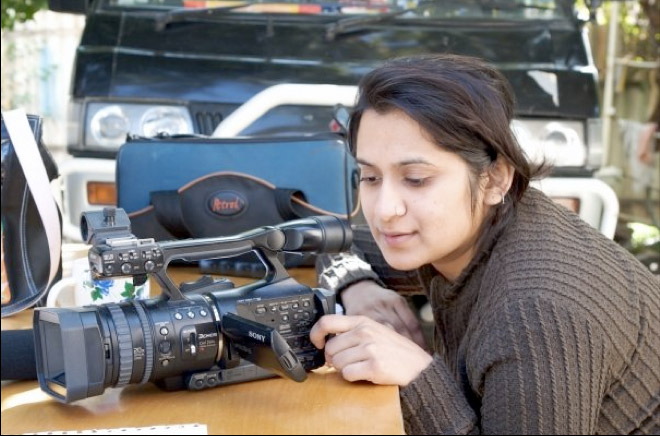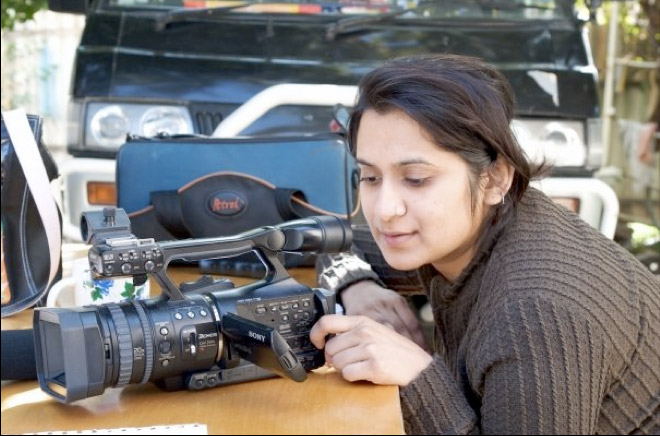
Ruchika Muchhala says that being a TCK has influenced her to make films that explore the layers of complexities within cultures and institutions. Born and raised in Jakarta, Muchhala went to high school in Singapore, moved to the U.S. to attend the University of Michigan and now resides in Mumbai.
Muchhala started her own production company, Third Kulture Films, and has recently co-directed a film following the process of arranged marriages in India. She also served as an assistant editor on the 2006 Academy Award winning documentary Born Into Brothels. Her current film, The Bollywood Project, is a documentary that features the reality and fantasy worlds of four Bollywood artists: a foreign actor, a backup dancer, a union boss, and a transgender makeup artist.
1. How did you get into the film business?
Film is really part of communicating what it means to be a TCK for me. In high school, we had to fill out profiles for what jobs we would be best at, and when I did mine, it came up with documentary film. At the time, I wanted to get into non-documentary film, but as I continued in my career, I started to really enjoy the advantages of documentaries. A documentary allows you to discover plot and casting from the people that you are working with, and you have a lot more freedom to incorporate political and social commentaries. The career profile turned out to be right.
2. What was it like to start your own production company?
Starting Third Kulture Films was a way for me to challenge myself and show that I was serious about film. By the time I started the company, film wasn’t just a hobby anymore, and it was part of increasing my professionalism and developing a reputation.
3. Tell us about your Bollywood documentary. How did you develop the idea?
It started as a web series that my business partner, Adam, was working on. I had been living in India for six months, working with all sorts of amazing filmmakers, and so we were able to use the connections that I already had made in country. Adam is from the U.S., and even though I’m ethnically Indian, I grew up in Singapore, so we were both outsiders to the Bollywood world, and weren’t interested in the hierarchy of Bollywood stardom.
One of the artists we follow throughout the film is the makeup artist for a famous Bollywood star, and he had been used to aggressively defending the validity of his job using her name. He would always introduce himself as “the makeup artist for Aishwarya,” and when we first started interviewing him, he would always talk about his work in relation to her. Finally, we said “Well, yeah but tell us who YOU are,” and he was really surprised. We got the artists’ “other” stories, the real ones that didn’t revolve around the star.
4. The film follows four artists in Bollywood. What did you learn in getting to know these artists throughout your four years of filming?
I learned that Bollywood isn’t just a fun genre with lots of colourful clothes and light plots. It’s really an industry, a place where people are working and living. In the documentary, the dancer we interview is a single young woman who would normally get a lot of criticism about not being married. Because she’s in Bollywood, when people ask her about it, she can say “I’m supporting my family through my career, so if I got married and had kids, I wouldn’t be able to do that anymore.” Her identity is really validated by her status as a Bollywood dancer. It legitimizes her.
5. What have you found is one of the public’s biggest misconceptions about Bollywood?
People just don’t think about Bollywood that hard. To most people, Bollywood equals stars, bright colors and waxed-chested men. You don’t think about these things, but all Bollywood men have to wax their chests! The public usually doesn’t think about all the people involved in the industry; the support workers, the unions, the crews for all the films. We’ve really found that within the culture of Mumbai, there’s another inner circle of the culture of Bollywood.
6. What does a typical day look like for you?
I’m all over the place! When I’m in production, I have weird hours, and will be working on edits until 4 in the morning. But when I’m not in production, there’s a lot more computer work, and I can set my own schedule much more easily.
7. How has being a TCK helped you with your career?
When people first see my company’s name, some people ask me: “Why is there a K in Kulture?” and I have to explain what a TCK is and a little about my background. I find that throughout my work, I have a different perspective, one that is a little less one-sided than someone who has not grown up as a TCK. I always consider that there are other realities than the one that I immediately see in any given situation, and I try to communicate those different perspectives in my films.
8. What advice would you have for a TCK wanting to get into filmmaking?
Constantly draw inspiration from your own life. When you are trying to extract a story from people, think about your own story and how you’d like to be treated. For example, I never ask someone “Where are you from?” because I know how much it annoys me!
9. This film deals with identity transformation. What has the film taught you about your own identity?
I find that I’ve really internalized things through working with these individuals in the documentary for four years. The foreign actor talks about feeling like a fish in a fishbowl as a foreign Bollywood actor, and I’ve often felt like that as well. Even though I’m Indian, people are always putting pressure on me to be more Indian, and I don’t feel like I completely fit in, like the foreign actor.
A union boss almost died after major surgery, and when he came back, I asked him whether he was going to retire, expecting that he’ll want to quit after such an intense experience. He told me “’Til these limbs stop working, there’s no retirement,” and I really want to have that same perspective as well. When this film stuff gets hard, it’s a good reminder to myself to keep going.
